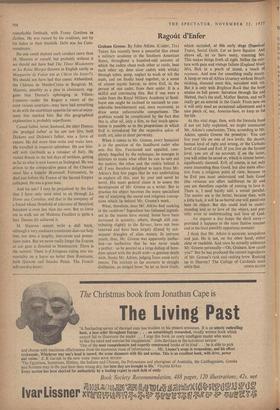Ragout d'Enfer
Graham Greene. By John' Atkins. (Calder, 21s.) THERE has recently been a powerful film about a military academy in the Southern American States, throughout a hundred-odd minutes of which the cadets cheat each other at cards, beat each other up, dose nicer cadets with whisky through tubes, pimp, neglect to wash or tell the truth, and yet finally band together, in a scene of almost mystic horror, to drive Evil, in the person of one cadet, from their midst. It is a skilful and convincing film. But if one were a cadet from the Royal Military Academy at Sand- hurst one might be inclined to succumb to con- siderable bewilderment and, once recovered, to draw some unfavourable comparisons. The problem would be complicated by the fact that this is, after all, only a film, so that much specu- lation is possible as to the proportions in which Evil is introduced for the respective sakes of truth, art, sales or sheer perversity.
When it comes to Mr. Greene, every humanist is in the position of the Sandhurst cadet who sees this film. Fascinated and appalled, com- pletely beguiled by the technique, he emerges in delirium to make what effort he can to sort out the motive, the ethos and the reality behind it all. I was therefore delighted to learn from Mr. Atkins's first few pages that he was undertaking to explain all this, year by year and novel by novel. His more general claim is to assess the development of Mr. Greene as a writer. But in practice his object becomes the more specialised one of analysing the moral and religious concep- tions which lie behind Mr. Greene's work.
What, therefore, does Mr. Atkins find cooking in the cauldron? Ingredient has followed ingredi- ent as the moons have waxed. Some have been increased in quantity; others, though still con- tributing slightly to the flavour, have not been renewed and have been largely diluted by sub- sequent draughts of alien waters. In extreme youth, then, Mr. Greene was apparently ineffec- tive—so ineffective that he was never made a prefect : so he poured in a large dollop of bore- dom spiced with the death wish—a genuine death wish, thinks Mr. Atkins, judging from some early poems. The mixture so far amounts to straight disillusion, an insipid brew. So let us have Guilt,
which included, at this early stage (Stamboul Train), Social Guilt. Let us have Squalor. And above all, let us have nasty, steaming Sex. This makes things froth all right. Stiffen the mix- ture with pain and vintage failure (England Made Me), flick in a pinch of incest, a 'touch of voyeurie. And now for something really meaty. A lump or two of Africa (Journey without Maps), stinking, diseased meat this, succulent with rot. But it is only with Brighton Rock that the brew attains its full power. Salvation through Sin and Hatred, that's the stuff, Mother Beeton, and we'll really get an asterisk in the Guide. From now on it will only need an occasional adjustment and a nice pinch of, say, America-hate, to keep us fat for life.
At this vital stage, then, with the formula fixed if not yet fully exploited, we might summarise Mr. Atkins's conclusions. Thus, according to Mr. Atkins, speaks Greene the proselyte : You can live your life on one of two levels; the decent, human level of right and wrong, or the Catholic level of Good and Evil. If you live on the former level, you are of no account; if on the latter, you will either be saved or, which is almost better, significantly damned. Evil, of course, is not only more interesting than Good, but also more effec- tive from a religious point of view, because to be Evil you must understand and hate Good (the virtuous are often indifferent to it) and you are therefore capable of coming to love it. There is, I need hardly add, a sexual parallel. The nastier sex is the better, because then, with a little luck, it will be so horrid one will positively hate its object. But this could lead to under- standing and so to love of the object, and pos- sibly even to understanding and love of God. . . . An orgasm a day keeps the devil away— provided it happens in the most furtive manner and at the least possibly opportune moment.
I think that Mr. Atkins is accurate, scrupulous and just. He is not, on the other hand, either clear or readable. And once he actually addresses Mr. Greene personally—'Oh, Graham, how could you?' But he has produced the correct ingredients of Mr. Greene's rank and reeking brew. Reeking up to Heaven? The College of Cardinals must










































































 Previous page
Previous page